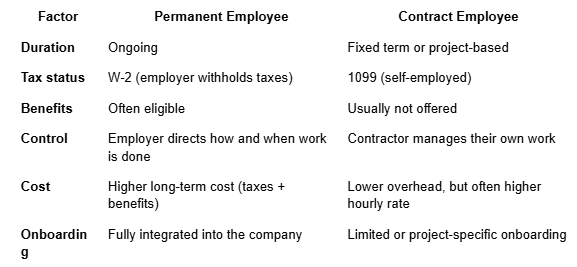What is a permanent employee?
A permanent employee is a worker hired to fill an ongoing role within a company, with no predetermined end date to their employment. They may be full-time or part-time, but unlike temporary or contract workers, permanent employees are considered long-term team members.
For small business owners, it’s important to recognize the differences between employee types to ensure your business is compliant and your employees properly compensated. For example, permanent employees are typically eligible for benefits, protected by employment laws, and paid through the company’s payroll system.
Key characteristics of a permanent employee
A permanent employee may work 40 hours a week or a reduced schedule, but their employment is considered indefinite unless terminated by the employer or employee. Key attributes include:
- Ongoing role: No set contract expiration date
- Direct payroll: Paid as a W-2 employee through company payroll
- Tax withholdings: Employer withholds income tax, Social Security, and Medicare
- Benefits eligibility: May qualify for health insurance, retirement plans, paid time off, and other perks
- Legal protections: Covered by federal, state, and local labor laws
- Internal status: Integrated into company operations and often has growth potential within the business
Permanent employees are typically distinguished from temporary, seasonal, or contract workers, all of whom are hired with a defined scope or timeline in mind.
Differences between a permanent employee vs. contract employee
Employers often ask: “Should I hire someone permanently or on contract?” The answer depends on your staffing needs, budget, and risk tolerance. Here are some details that might help you decide:

Hiring permanent employees makes sense when you need consistency, loyalty, and investment in your company’s long-term goals.
Why employers hire permanent employees
Hiring permanent staff has several long-term advantages for small businesses:
- Stability: Reduces turnover and builds a reliable team
- Productivity: Employees gain deeper knowledge of your systems, customers, and processes
- Team culture: Permanent employees contribute more to morale, mentorship, and shared goals
- Legal clarity: Easier to stay compliant when workers are clearly employees, not misclassified
- Upskilling potential: You can train and promote from within
- Cost predictability: While benefits and payroll taxes add to cost, compensation is often more predictable than hourly contractor work
Permanent team members often deliver higher long-term value, especially in customer-facing or leadership roles.
What responsibilities do you have to permanent employees?
Hiring a permanent employee comes with obligations, including:
- Accurate classification: Classify them as W-2 employees and follow wage laws (FLSA, state rules)
- Payroll tax withholdings: Deduct and remit federal and state income taxes, plus Social Security and Medicare
- Benefits administration: Depending on your size and state, you may be required to offer healthcare, paid leave, or retirement options
- Workplace policies: Apply labor protections around overtime, harassment, termination, and safety
- Recordkeeping: Maintain I-9s, W-4s, timesheets, pay stubs, and employment records
Permanent employees are legally protected in ways that contractors are not—making compliance and documentation even more important. When you’re juggling different employee types, using hiring & onboarding software can be a great way to keep track of your responsibilities to each member of your team.
Onboarding and supporting permanent employees
To set your permanent hires up for success, focus on:
- Structured onboarding: Introduce policies, systems, and workplace culture
- Role clarity: Provide clear expectations, job descriptions, and performance goals
- Scheduling consistency: Use scheduling tools that ensure fair and predictable shifts
- Training and growth: Offer upskilling opportunities that support retention
- Transparent payroll: Use a system that provides clear pay stubs, tax forms, and real-time access to hours and earnings
The way you onboard and support permanent employees directly impacts performance, loyalty, and long-term retention.
How Homebase helps you manage permanent employees
Homebase is built for small business employers who want to grow a reliable, long-term team without drowning in admin work. With Homebase, you can:
- Post jobs and hire permanent employees
- Customize onboarding flows with digital forms and document storage
- Automate time tracking, scheduling, and availability management
- Run accurate payroll with tax withholdings and W-2 filings
- Store personnel files and maintain compliance in one place
Whether you're hiring your first full-time employee or expanding your core team, Homebase gives you the tools to do it right—faster. Sign up for Homebase today to streamline the entire process of building and managing your permanent team.